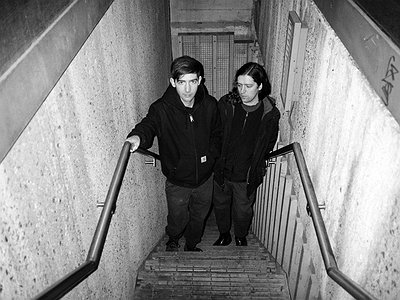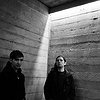Part 2
Could you take us through a day in your life, from a possible morning routine through to your work? Do you have a fixed schedule? How do music and other aspects of your life feed back into each other - do you separate them or instead try to make them blend seamlessly?
We’d be lucky to have an entire day dedicated to Circuit Breaker, but when we do it’s: wake up, have breakfast, meet at Ed’s flat and take a taxi with all our equipment to a rehearsal studio. We rehearse every week, but talk most days, (mostly about the group). We use instant messaging to bounce ideas off one another, but again, I don’t think there is anything special about us doing such a thing. All these things are just different strategies for carrying on with your life as much as they are strategies for the band.
Could you describe your creative process on the basis of a piece or album that's particularly dear to you, please? Where did the ideas come from, how were they transformed in your mind, what did you start with and how do you refine these beginnings into the finished work of art?
The start and end points of our creative process are definitely blurred. Just because we are recording an album at a particular time, all that we invest into it creatively and emotionally would have been bubbling away a long time before that given moment. Hands Return To Shake could be said to have a psychogeographic relationship to Milton Keynes, but we didn't set out for this to be the case. We had planned a totally different cover but when we saw what would become the cover photo, (the image of Milton Keynes shopping centre), everything just fell into place.
For us it’s a place completely without heritage and history, it is completely constructed (like synthesis). When there is no space for the organic or spontaneous, everything has had to be designed & deliberate (like our working process). There are so many weird contradictions in the city. Loads of quite modern public sculpture rubbing up next to corporate branding, tropical wildlife next to concrete structures (a balance of seemingly contradictory elements). That city became an analogue for our working process which is in turn an analogue for our lives.
There are many descriptions of the ideal state of mind for being creative. What is it like for you? What supports this ideal state of mind and what are distractions? Are there strategies to enter into this state more easily?
The reality of life under late capitalism is that we find the time we actually have to spend on this project becoming increasingly less ideal. Obviously actual distractions which impinge on the ‘physically getting it done’ side of things are always un-welcome, but an ideal state of mind is a privilege we are often without. The aim is to just do the job whenever we can and as often as we can.
I remember watching a Stewart Lee interview where he says something to the effect of the older he gets, when he sees a performance, the most important thing for him is that he can believe that the artist has some investment in what they are doing. Perhaps the ideal state of mind is one in which you have surrounded yourself with your interests and influences, having complete command over them but also at the same time being liberated from them.
How is playing live and writing music in the studio connected? What do you achieve and draw from each experience personally? How do you see the relationship between improvisation and composition in this regard?
I suppose we are quite traditional in the sense that we have songs which are recorded as albums and then we perform those compositions live. We believe it would be pointless if the live show was simply a close as possible a replication of the records. We aim for a marked difference between the two experiences. We make the records first with no limits regarding the amount of layers which make up a track and then after a song is finalised in its recorded form, we then work out whether or not it would lend itself to a live performance.
We’d hope that people’s expectations of a live performance are such that it offers us an opportunity to present something more stripped back, raw and responsive. Ed’s birthday present was a boxset of Pere Ubu’ 90’s albums. We enjoyed it so much that we got a live bootleg from the same era which dispenses with the synth and adds a cello! It’s a much heavier version of that band with just the right amount of ‘rough around the edges’. The versions of the songs on the bootleg become an entirely new set and as a fan of a group that feels so generous.
How do you see the relationship between the 'sound' aspects of music and the 'composition' aspects? How do you work with sound and timbre to meet certain production ideas and in which way can certain sounds already take on compositional qualities?
Rarely does either one of us experience a sound and feel as if it prejudices one type of composition over another. Most of what we listen to is abstract electronic music and therein lies the challenge of the band. Can the nasty synth sound which is in this noise track serve as the basis for a rock-song? What about the industrial beat in this techno,could that work underneath a guitar-riff? What would the textures on this dark-ambient album sound like with singing? I think it was Kurt Cobain who said: “Why cant you be The Beatles and Black Sabbath”. Hopefully we’ve taken that logic a bit further… “Why can’t you be Gary Numan and The GRM?”
We are not immune to equipment being the driving force behind a composition. Often when have a new ‘thing’,we start by experimenting and when we find a sound or texture that we like, it can form the basis of a song. But ultimately we will still be aiming to coax something counter-intuitive out of whatever it is. The artist Rob Lye recently said to me.. “I hate things when they sound like they are meant to sound” and I have a lot of sympathy with that attitude.
Our sense of hearing shares intriguing connections to other senses. From your experience, what are some of the most inspiring overlaps between different senses - and what do they tell us about the way our senses work? What happens to sound at its outermost borders?
We both studied visual art and at that time it was very theory based. So our critical reflexes are trained to err more towards the conceptual than the sensory .We are both big fans of other art forms like cinema, literature, (particularly science fiction), and visual art. I would say that it's rarely the case that we, for example, ‘see’ something visual and think, ‘that same experience could be captured audibly’. We are more likely to take away an emotion or idea evoked by an artwork and then try to create a song which we would hope could elicit those same feelings.
At the moment Peter is reading ‘Frankenstein Unbound’ by Brian Aldiss, about a 21st century man falling through a time-slip and finding him self engaging with the author of the original Frankenstein in 19th century Geneva. It's about picking apart an old artwork from a contemporary standpoint. Conceptually, that feels like what we are doing in Circuit Breaker and to find that parallel in a novel feels really enriching. Unfortunately we are not about to go and compose our ‘Threnody For Time-Slip Frankenstein’.
Having said all this, the language of synthesis shares a lot with visual language. When sculpting a sound you are combining different shapes of waves and creating patterns. These are all useful visual ‘hooks’ to help you ‘think in sound’.
Making music on a computer is also a very visual thing, once you've seen a recorded sound’s wave form it becomes difficult not to be influenced by how they look. Midi data is another area in which visual patterns emerge that may affect how you feel about them. Dean Hurley, David Lynch’s music director, recently found out that the midi files for Angelo Badalamenti’s Twin Peaks score actually form an image of two mountains! The iconography of the art haunts the midi’s self presentation.
Art can be a purpose in its own right, but it can also directly feed back into everyday life, take on a social and political role and lead to more engagement. Can you describe your approach to art and being an artist?
We just want to make our art the best version of itself that it can possibly be. Everything is political, from the way you engage with promoters, publishers, etc, etc, to how you chat to the person who runs the practise space. It is all an expression of how you believe you should be in the world. The flip side of that is that all these experiences feed into the work. When you distill everything down to its very essence, it will reveal some form of self portrait. Everyday life, the art we produce and the politics we abide by are all one big ourobourous-esque loop. Our latest album might appear more introspective, after having more politically hyperbolic lyrics in its predecessor, but for us the personal became political and we hope that people can actually spot more shared experience in these intimate moments than in the sloganeering.
It is remarkable, in a way, that we have arrived in the 21st century with the basic concept of music still intact. Do you have a vision of music, an idea of what music could be beyond its current form?
In the 20th century music has already found itself completely deconstructed (Italian futurists, music concrete, etc), so because of its plurality, the concept will likely remain intact for even longer. The structures which surround music? That is where the overhaul needs to happen.






